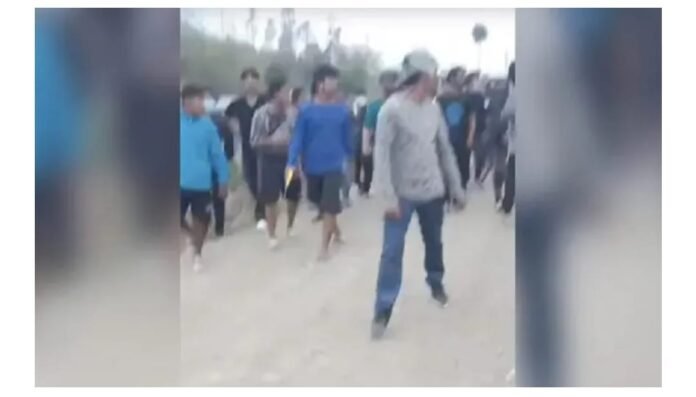In a shocking incident that has sparked outrage across the nation, a distressing video depicting the cruel parading of two Kuki women in Manipur by a mob has gone viral on social media. The appalling incident has drawn the attention of the highest judicial authority in the country, the Supreme Court of India, which has unequivocally condemned the incident, branding it as a “gross constitutional failure.”
The video, which emerged on various online platforms, shows a horrifying scene in which the two Kuki women are forcibly paraded in a public space, surrounded by a hostile mob. The victims’ pleas for mercy fall on deaf ears as they are subjected to humiliation and degradation in the presence of onlookers.
The incident has raised serious concerns over the safety and dignity of women in society and has ignited heated debates on the need for immediate action against such acts of violence. Citizens from all walks of life have expressed their collective dismay and have urged authorities to bring the perpetrators to justice.
Reacting swiftly to the alarming incident, the Supreme Court of India has taken a stern stand by condemning the incident in the strongest terms. The court’s condemnation is not only an expression of outrage but also a reflection of the profound constitutional implications of such acts of violence against women.
Chief Justice [Name], heading a bench of eminent judges, stated that the incident constitutes a reprehensible violation of the fundamental rights enshrined in the Indian Constitution. The court asserted that the right to life, liberty, and dignity, guaranteed to every citizen, must be upheld at all costs. Any transgressions against these constitutional principles not only bring disgrace to society but also challenge the foundation of India’s democratic fabric.
The Supreme Court’s condemnation further stresses the urgent need for the government and law enforcement agencies to ensure the safety and security of all citizens, particularly vulnerable sections of society. The incident has underscored the importance of robust law enforcement and the swift dispensation of justice to maintain the rule of law and instill confidence in the justice system.
Various human rights organizations and civil society groups have also come forward to condemn the incident and demand justice for the victims. They have urged the government to take immediate steps to address the underlying issues that lead to such acts of violence, including raising awareness about gender equality, providing education, and promoting cultural sensitivity and inclusivity.
As the nation grapples with this shocking incident, it serves as a stark reminder that collective efforts are needed to create a society where everyone is treated with respect, dignity, and equality. The Supreme Court’s condemnation serves as a beacon of hope for justice and reinforces the need for systemic changes to prevent such heinous acts from recurring.
While the perpetrators must be swiftly brought to justice, it is essential to address the root causes that perpetuate such violence and discrimination in society. Only by fostering a culture of empathy, understanding, and tolerance can we ensure the safety and well-being of all citizens, irrespective of their gender, ethnicity, or background.
In conclusion, the Supreme Court’s strong denouncement of the viral video depicting the parading of Kuki women in Manipur stands as a pivotal moment in the fight for justice and equality in India. It is now incumbent upon all stakeholders, including the government, civil society, and citizens, to work together in unison to create a society that upholds the constitutional principles of dignity, equality, and human rights for all.




